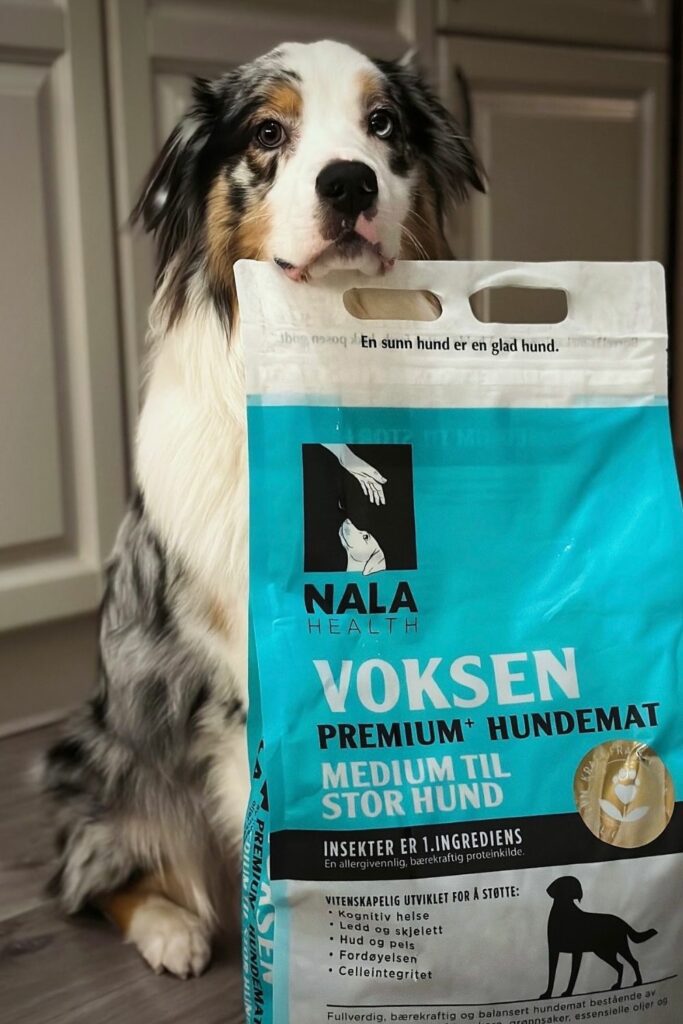IBD in Dogs: Togo’s Road to Recovery
 Cecilie Hemsen Berg
Cecilie Hemsen Berg
Lisbeth and her family had long dreamed of welcoming a puppy into their home, and at the end of 2023, that dream became a reality. They wanted an active and loyal companion, and their hearts were set on an Australian Shepherd—a breed celebrated for its intelligence and boundless energy. Inspired by the touching film about the legendary sled dog, they named their new pup Togo.
Togo quickly became the heart of the family, bringing joy and energy into their home. But their happiness was soon overshadowed by concern when he started showing alarming symptoms—vomiting, diarrhoea, and eventually, bloody stools. Despite multiple veterinary visits, there were no clear answers, leading the family through a long, exhausting, and costly journey before Togo was finally diagnosed with inflammatory bowel disease (IBD). This challenging condition affects digestion and overall well-being, and for Togo, finding the right treatment and a diet that could stabilize his health became a difficult but crucial battle.

This is the story about Togo who went from battling with serious digestive issues and eventually regaining his health with a new diet.
An Active Family: Togo and Lisbeth Story
With a passion for outdoor activities throughout the year, the family conducted thorough research to find the perfect breed. Their search ultimately led them to the Australian Shepherd—a highly intelligent and energetic dog that matched their active lifestyle. Despite its name, the breed has no real connection to Australia; instead, it originated in the United States, where it became an invaluable working companion for cowboys. From California, the Australian Shepherd quickly gained popularity across the western U.S., prized by ranchers for its endurance, drive, problem-solving skills, and strong work ethic—qualities essential for herding cattle and other livestock.
For many years, Lisbeth had dreamed of having a four-legged companion to practice rally obedience with, learn new tricks, and simply enjoy endless fun together. The Australian Shepherd, known for its hardworking nature and cooperative spirit, is highly trainable and makes a fantastic family dog for an active household.
Understanding IBD in Dogs: How It Affected Togo
Inflammatory Bowel Disease (IBD) is a chronic condition that affects the lining in the digestive system, leading to persistent issues such as diarrhoea, vomiting, weight loss, and poor nutrient absorption. While the exact cause of IBD remains unclear, researchers suggest that genetics, an overactive immune response to proteins, or an imbalance in gut bacteria may contribute to inflammation in the gut lining.

For Togo, the symptoms appeared early. Despite his playful nature, the young puppy frequently vomited, leaving Lisbeth puzzled and concerned. Multiple vet visits provided no clear answers—tests indicated he was healthy, and there were no obvious signs of illness beyond the vomiting. But as time passed, Togo became increasingly lethargic, his usual energy fading.
The most common IBD symptoms include:
- Diarrhoea may be bloody and/or slimy
- Nausea and vomiting
- Bloating/Flatulence; rumbling and abdominal pain
- Poor appetite, but in some cases the dog may seem hungry all the time because the intestines are unable to absorb nutrients
- Weightloss
- Lethargy
Determined to help him, the family worked closely with their vet, experimenting with different diets in hopes of finding one that would support his sensitive digestive system.
Navigating IBD Flare-Ups: The Unpredictable Health Journey
With the new food prescribed by the vet, it seemed the family had finally found a solution. Togo was eating well, full of energy, and back to his playful self. But the relief was short-lived, and Togo´s condition relapsed.
One day, without warning, he became seriously ill again—vomiting excessively and suffering from severe diarrhoea, likely triggered by something his sensitive stomach couldn’t tolerate. The family rushed him to the vet, where treatment helped stabilize his condition. For a couple of months, he seemed to be doing well, but then the symptoms returned—vomiting, followed by bloody diarrhoea.
In consultation with the vet, they changed his food again. Yet, despite extensive testing, nothing conclusive was found. Togo still had an appetite, but his energy was fading—he was no longer as playful or agile. Then, in November 2024, his condition took a dramatic turn for the worse. He was suddenly struck by severe, bloody vomiting and diarrhoea, requiring urgent admission to the veterinary hospital.

Togo spent five days in the hospital before he was stable enough to continue treatment at home. The vet prescribed medication and a new specialized diet. By this point, countless blood tests, multiple ultrasound examinations, and stool samples had been conducted, yet none provided clear answers.
Then, in early December 2024, Togo suffered another severe relapse and was rushed back to the hospital. This time, the vets decided to perform an endoscopy to investigate suspected IBD further.
Togo’s IBD Diagnosis: A Challenging Path to Clarity
It was a long, distressing, and at times terrifying journey before Togo finally received a diagnosis—Inflammatory Bowel Disease (IBD). For the family, getting answers brought a sense of relief, but it also marked the beginning of a new challenge: finding the right treatment and diet to give Togo a stable, comfortable life.
By the end of 2024, Togo’s condition had worsened significantly. He frequently had loose, mucus-filled stools. Although he continued eating, he showed little enthusiasm for daily life. During dog training sessions, he suddenly lost all focus, preferring to stand in one spot and sniff the ground. Eventually, they stopped attending altogether.
At home, he mostly lay still, seeking solitude. He panted from discomfort and suffered from severe bloating. While his stools became slightly firmer, they remained mushy and slimy. After consulting with the veterinarian, they decided to try another change in diet while continuing his medication. Lisbeth also received several new recommendations regarding his food.
“I wasn’t satisfied with the recommendations, so I started researching different types of food and learning what it truly means to manage IBD. That’s when I discovered Nala Health. I examined the ingredients and instantly fell in love with the formulation. We just had to give it a try,” she says.

Togo’s Transformation with the Right Diet
“Towards the end of December, we started feeding Togo Nala Health. By early January, his stools had already transformed from mushy and slimy to firm. And as the month progressed, they became even better. Since switching to Nala, he hasn’t had any issues with flatulence. His fur, which had been severely affected by medication, is now thick, silky soft, and even has a pleasant scent,” says Lisbeth.
“Togo’s quality of life has improved significantly since starting Nala. He is now so stable that we’ve begun gradually reducing his medication. He’s more joyful, eats better than ever, eagerly joins us for walks, and wants to be involved in everything we do. At dog training, he’s regained full focus on his tasks, and overall, he just looks genuinely happy. Nala has truly been a lifesaver for Togo,” Lisbeth concludes.
Understanding IBD in dogs
Inflammatory Bowel Disease (IBD) is a chronic inflammatory condition that affects the lining of the digestive tract, with symptoms ranging in severity. Dogs with IBD often experience unpredictable cycles of good health followed by sudden flare-ups, reminding their owners that managing the condition is an ongoing challenge.
The exact cause of IBD remains uncertain, but several factors may contribute to its development:

- Genetics – Some breeds may have a genetic predisposition to IBD.
- Weakened Immune System – An overactive immune response may trigger chronic inflammation.
- Infections – Viral, bacterial, or parasitic infections can contribute to IBD.
- Food Sensitivities – Adverse reactions, often to proteins like chicken, beef, soy, or wheat, can trigger inflammation.
- Medication Reactions – Certain medications, such as prednisolone, cortisone, repeated antibiotic courses, or vaccines, may play a role.
- Gut Microbiome Imbalance (Dysbiosis) – Disruptions in the natural bacterial balance of the intestine can worsen symptoms.
- Histamine Intolerance: Some dogs have low levels of the enzyme diamine oxidase (DAO), which helps break down histamine. This can be diagnosed with a blood test measuring histamine levels. Foods high in histamine include cheese, fermented foods, organ meats, processed meats (such as sausages and bacon), shellfish, and tomatoes.
Diagnosing IBD in Dogs
The most reliable method for diagnosing IBD is a tissue biopsy of the intestines. Additional tests may include:
- Stool analysis – To check for harmful microorganisms in the gut.
- Blood tests – To assess B12 and folate levels, which are often affected in dogs with IBD.
Accurate diagnosis is key to managing IBD effectively, helping dog owners find the right treatment plan to improve their pet’s quality of life.
Treatment will usually consist of a combination of medication and dietary changes, but since there can be many causes of the inflammation, it will often be a trial-and-error process. Furthermore, the dog may be given a broad-spectrum worming treatment because stool samples do not always reveal specific parasites that may be present in the intestines.
Choosing the Right Diet for Dogs with IBD
Selecting a diet that minimizes inflammation is essential, whether you opt for wet or dry food. It’s important to note that raw meat may contain parasites, which is why many veterinarians are hesitant to recommend raw feeding to dogs with IBD.
Key Dietary Considerations
- High-Quality, Easily Digestible Protein
Clean protein sources that are less likely to trigger inflammation include venison, black soldier fly larvae, ostrich, and rabbit. Some veterinarians may also recommend hydrolyzed protein.

- Elimination Diet
An elimination diet may help identify food sensitivities. Common allergens include beef, chicken, dairy, eggs, corn, wheat, soy, artificial flavours, colours, and preservatives such as BHT, BHA, and sodium nitrite. - Beneficial Fatty Acids
Healthy fats with a balanced ratio of omega-3, -6, and -9 can support gut and skin health. Good sources include coconut oil, canola oil, olive oil, flaxseed oil, and pure fish oils. Marine algae is a rich and sustainable alternative to fish oil for omega-3.
- Fibre and Nutrient-Rich Carbohydrates
Ingredients such as sweet potatoes, carrots, and gluten-free grains like millet, sorghum, oats, and quinoa provide fibre, plant protein, and antioxidants. Fibre plays a crucial role in gut health by nourishing beneficial bacteria and helping to regulate stool consistency. We find fibre in vegetables, fruits, grains, legumes and black soldier fly larvae (there is no fibre in meat or fish). - Gut-Supporting Supplements
Probiotics and butyrate can help create a healthy intestinal environment, strengthen the gut lining, and reduce the risk of leaky gut syndrome.
By choosing the right diet and monitoring your dog’s response, you can help manage IBD symptoms and support a more stable, comfortable life for your pet.
Nala Health: A Gut-Friendly Option for Dogs with IBD
While Nala Health dog food is not specifically formulated for IBD, it can be a suitable choice due to its carefully selected ingredients that support digestive health:
- Allergy-Friendly, Single Protein Source: Uses black soldier fly larvae, a novel protein that is gentle on sensitive stomachs.
- Gluten-Free Ingredients: Includes millet, sorghum, oats, lentils, and chickpeas, reducing the risk of gluten-related sensitivities.
- Gut-Supporting Nutrients: Contains probiotics, chicory root (a source of inulin fibre), and butyrate to promote a balanced gut microbiome.
- Healthy Fatty Acids: Derived from cold-pressed rapeseed oil, coconut oil, and black soldier fly larvae (rich in lauric acid) to support skin, coat, and digestive health.
- Beneficial Fibre Sources: Carrots, sweet potatoes, peas, baobab fruit, and alfalfa provide essential fibre for gut motility and overall digestive wellness.
- Omega-3 from Marine Algae: A mild anti-inflammatory alternative to fish oil, supporting skin, coat, and joint health.
- Botanical Extracts with Health Benefits: Includes oregano, cinnamon, paprika, and sweet chestnut, which add natural phytochemicals with potential gut-supporting properties.
- Natural Preservatives: Uses tocopherols (vitamin E), vitamin C, rosemary extract, and clay minerals for safe, long-lasting freshness without artificial additives.

With its nutrient-rich, easily digestible formulation, Nala Health can be a great option for dogs with sensitive digestion, helping to support overall health and well-being.
Natural Supplements to Support Digestive Health
When managing a dog with IBD or digestive sensitivities, certain natural supplements may help support gut health and overall well-being. However, always consult a veterinarian before introducing new herbs or supplements.
- Milk Thistle or Dandelion: A holistic veterinarian may recommend a detox regimen, especially for dogs that have been on long-term medication. Milk thistle is available in capsule form, while dandelion is often sold as a tea. Both herbs provide mild liver-cleansing benefits.
- Psyllium Husk: Adding a level teaspoon of psyllium husk stirred into water and mixed into food once a day can help cleanse the intestines, nourish beneficial gut bacteria, and firm up stools.
- Chamomile Tea: Has mild anti-inflammatory properties that can soothe the digestive tract.
- Rooibos Tea: Naturally rich in antioxidants, supporting immune and digestive health.
- Dog-Friendly Bone Broth: Homemade bone broth, ideally made from bones of animals or fish that have not been treated with antibiotics or other medications, can provide essential nutrients for gut health. Get our recipe for dog-friendly bone broth here.
Interested in Reading More?
Always consult a veterinarian before giving herbs or supplements to ensure they are appropriate for your dog’s specific needs.
Conclusion
Togo’s journey is a powerful reminder that managing IBD in dogs requires patience, perseverance, and a tailored approach. Despite facing severe, recurring symptoms and an uncertain diagnosis, Togo’s transformation through dedicated veterinary care, a strategic diet, and gut-supportive supplements shows that even the most challenging cases of IBD can be managed. His story underscores the importance of understanding IBD in dogs, remaining vigilant for changes in your pet’s condition, and working closely with your veterinarian to find the optimal treatment plan. With the right balance of nutrition and care, dogs with IBD can enjoy a renewed quality of life, just as Togo did.

